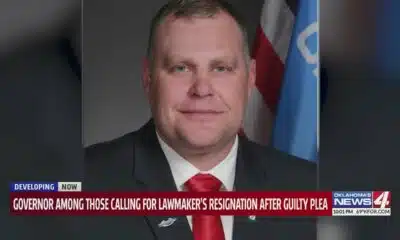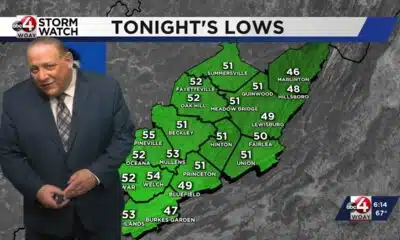News from the South - Louisiana News Feed
Cold alerts for Friday and your Holiday Parade forecast
SUMMARY: A cold air mass is moving in, prompting cold advisories, especially on the North Shore, where temperatures could feel as low as 20°F due to wind chill. Tomorrow morning, expect temperatures between 28°F to 30°F in various areas. While the South Shore will also be chilly, it won’t reach advisory levels. Saturday’s holiday parade will see temperatures around 59°F, with some sunshine and a slight chance of drizzle. Following the weekend, rain is forecasted for Monday and Tuesday, with additional cold temperatures expected by the end of next week.
Meteorologist Devon Lucie breaks down this round of cold air showing you where the coldest spots will be, how cold you’ll feel, how long it will last, then steps us through the Children’s Hospital Holiday Parade forecast for cloud cover, rain chances, and temperatures while highlighting our next likeliest round of rain after the weekend and a full seven day forecast to finish.
Subscribe to WDSU on YouTube now for more: http://bit.ly/1n00vnY
Get more New Orleans news: http://www.wdsu.com
Like us: http://www.facebook.com/wdsutv
Follow us: http://twitter.com/wdsu
Instagram: https://www.instagram.com/wdsu6/
News from the South - Louisiana News Feed
Remembering 20 years after Hurricane Katrina
SUMMARY: On August 29, 2005, Hurricane Katrina struck Louisiana as a Category 3 storm with 125 mph winds, making landfall in Plaquemines Parish. It became the third most intense U.S. landfalling hurricane, causing massive devastation and loss of life, with impacts still felt 20 years later. Across New Orleans, Jefferson, St. Tammany, St. Charles, Plaquemines, and St. Bernard Parishes, officials and first responders reflected on the tragedy, honoring resilience, sacrifice, and ongoing recovery efforts. Leaders emphasized remembrance, community strength, and commitment to building safer, stronger futures while mourning those lost and celebrating the courage of survivors.
Read the full article
The post Remembering 20 years after Hurricane Katrina appeared first on wgno.com
News from the South - Louisiana News Feed
K+20: Katrina showed how crucial federal funding is after a disaster. How much will remain?
by Julie O’Donoghue, Louisiana Illuminator
August 29, 2025
For years after Hurricane Katrina, New Orleanians made the Federal Emergency Management Agency the butt of their bitter jokes.
Anti-FEMA sentiment was so high in Louisiana that local businesses started selling T-shirts a couple of months after the storm lampooning the federal agency with slogans like “Where’s FEMA?” and “FEMA stands for Federal Employees Missing in Action”.
The sentiment is understandable. Almost a half dozen federal investigations launched in the six months after Hurricane Katrina made landfall Aug. 29, 2005 – and turned into the country’s most catastrophic natural disaster – determined FEMA failed in nearly every way to respond to the storm.
“Hurricane Katrina exposed flaws in the structure of FEMA and DHS that are too substantial to mend,” concluded a 2006 U.S. Senate report titled “Hurricane Katrina: A Nation Still Unprepared.”
Yet 20 years after the agency’s feckless Katrina response, some Louisiana leaders find themselves in the awkward position of having to defend FEMA.
President Donald Trump has made it clear he wants the federal government to play less of a role in natural disaster response, raising concerns that state and local governments might need to cover more of their recovery costs.
Such a change would likely affect Louisiana more than almost every other state in the country.
Since Katrina, Louisiana has received more public and individual assistance from FEMA ($12.6 billion) than all states but Florida ($16.6 billion) and New York ($19.4 billion), according to the Carnegie Endowment for International Peace, which tracks federal disaster spending.
The money helped Louisiana respond to 25 extreme weather events, including 11 hurricanes, six floods and one ice storm, over the past two decades.
That FEMA figure doesn’t account for all of the money Louisiana has received in the wake of Katrina. There was another $11 billion from the U.S. Department of Housing and Urban Development went to the Road Home program to rebuild housing. All told, the federal government put an unprecedented $76 billion toward Louisiana’s recovery from the 2005 storm.
Louisiana simply wouldn’t be able to handle the financial burden of major disaster response without significant support from the federal government, according to several former state officials interviewed. Storms with far less impact than Katrina have the ability to overwhelm the state’s assets, they said.
If Louisiana has to worry about covering more disaster recovery costs, the state will have less money to spend on schools, universities, roads, bridges and economic development.
“If we didn’t have the federal money, we would be in a terrible mess, and we would have been in a terrible mess from Katrina going forward,” said Jay Dardenne, Louisiana’s former lieutenant governor and state budget chief for former Gov. John Bel Edwards.
Uncertainty at FEMA
To what extent Trump will pull back on federal disaster assistance isn’t clear.
As recently as June, the president said he would push to eliminate FEMA altogether. He then backed off that rhetoric after July 4th weekend flooding in Texas killed at least 136 people, including children attending a sleepaway camp. His administration’s response was directly criticized.
Still, the Trump administration has already made several preliminary changes to FEMA that alarm emergency response experts. The agency has reduced staff and some of those who remain have been asked to help with hiring immigration enforcement agents instead of working on disaster relief.
The FEMA cuts come on top of those to the National Hurricane Center and other federal programs that provide crucial information to hurricane-prone states and help them ready for incoming storms.
Some reforms Congress enacted in the year after Katrina to strengthen FEMA have also been ignored. A law requiring FEMA’s director to have experience in emergency response and disaster recovery isn’t being followed. Trump’s acting FEMA administrator David Richardson previously oversaw counter terrorism programs but does not have natural disaster management experience.
There are also concerns about whether a new policy delayed assistance during the Texas flood, similar to what unfolded in the aftermath of Katrina.
Due to a bureaucratic breakdown 20 years ago, FEMA failed to promptly provide boats for search-and-rescue teams in New Orleans, even after federal officials knew flooding was widespread, according to a U.S. Senate report from 2006.
This past July, several questions were raised about whether search-and-rescue teams were delayed during the Texas flood because Homeland Security Secretary Kristi Noem now requires every FEMA contract over $100,000 to be approved personally by her, the Associated Press reported. The Trump administration has denied those allegations.
The ability of Louisiana and other states to respond to catastrophic weather with their own staff would also likely be impacted if Trump changes the traditional funding reimbursements for recovery efforts.
“The federal government will have a lasting role in responding to and funding the impact of disasters; local and state governments simply do not have the resources to do so,” said Paul Rainwater, who was executive director of the Louisiana Recovery Authority that managed federal funding for state rebuilding efforts after Hurricane Katrina. He went on to serve as former Gov. Bobby Jindal’s chief of staff and budget czar.
“The question the Trump administration faces, given some of its comments about FEMA, is: When will a White House step in and help?” he said.
Presidential discretion
The president has a significant say in when FEMA provides funding to states after natural disasters, as well as how much money states or local governments receive.
When a state is overwhelmed by a catastrophic event, a governor makes a formal request of the president for federal assistance. FEMA starts to provide help to the state authorities after it is granted.
Since returning to office in January, Trump has denied disaster relief that was expected to be approved. His decisions have affected liberal-leaning states such as Maryland and Washington and more conservative ones like West Virginia.
He even stalled for a month on accepting a disaster declaration from Arkansas Gov. Sarah Huckabee Sanders, who personally knows Trump and served as his press secretary during his first term as president.
As president, Trump has the ability to not only approve federal assistance, but to also increase the share of the state or local costs that FEMA will reimburse. For example, federal law gives presidents the discretion to reduce or waive the requirement for a state or local government to cover 25% of the cost of debris removal after a storm.
Louisiana has benefited from a reduction of these local financial responsibilities for nine weather events in the past 25 years, including for hurricanes Ida (2021), Laura (2020), Ike (2008), Gustav (2008), Rita (2005), Katrina (2005) and Ivan (2004). The 2016 Baton Rouge-area floods and a severe ice storm in 2001 were also approved for enhanced federal assistance, according to a 2023 Congressional report.
But all the upheaval should be a signal to local and state officials to prepare as if that extra FEMA help might not be coming their way, former FEMA administrator Deanne Criswell, who worked for President Joe Biden, said in a call with reporters this week.
“There are, right now, a lot of questions about whether any of those costs are going to be eligible for reimbursement,” Criswell said. “You need to put plans in place to make sure that you can do it, regardless of whether you get federal support.”
U.S. Sen. Bill Cassidy, R-La., said he personally advocated for the federal government to cover more disaster recovery bills after Hurricane Laura, which hit Southwest Louisiana, and the 2016 flooding.
Sometimes a disaster is so profound that local governments have a hard time coming up with the tax revenue to cover their share of the recovery. If people lose their homes and are displaced, as happened after Katrina, cities and parishes won’t have much money to put toward cleanup, Cassidy said.
“When you destroy a community, you destroy their ability to raise tax money,” he said in an interview.
Jindal, who served as Louisiana’s governor from 2008-16 and was a congressman during Hurricane Katrina, said he thinks the federal government will always be an important partner in major disasters. But states and local governments should take on more responsibility for smaller events.
“There are many day-to-day disasters that many state and local governments can handle themselves,” Jindal said. “For the bigger disasters that can overwhelm, you still want to have some federal role.”
It’s also crucial that local and state officials know what to expect from the federal government so they can be prepared, said Jindal, who was governor when hurricanes Gustav and Ike hit Louisiana.
“I think it’s important to have clear rules ahead of time,” he said.
Landry: Louisiana shouldn’t worry about FEMA
Trump may have denied disaster relief to other states, but Gov. Jeff Landry said Louisiana has nothing to worry about when it comes to FEMA because of his good relationship with the administration.
“I think it’s all just a bunch of media hype trying to scare people. We’re ready for hurricane season,” the governor told reporters this week.
Landry has a close relationship with Noem and said Trump’s homeland security leader has already responded to requests for assistance for matters in Lake Charles and Terrebonne Parish this year.
“What Kristi Noem has done lately, I mean, we just call her, and we say, ‘These are projects that need to be moved,’” Landry said.
Louisiana is one of only a few states that has a local representative on Trump’s FEMA review council, which is supposed to make recommendations on reforming the agency this fall.
One of the council’s 12 members, who include Noem and Department of Defense Secretary Pete Hegseth, is Louisiana native Mark Cooper, Jindal’s former head of emergency management and former Gov. Edwards’ chief of staff.
“Obviously, Louisiana is playing a big role in this reimagining for FEMA,” Cooper said this week in an interview from Oklahoma where the review council was meeting. “We’re being heard. Louisiana is being heard as part of this process.”
Cooper said the council already met directly with Louisiana emergency response officials in the Landry administration. It held its second public meeting in New Orleans in July at his suggestion.
The council has made no decisions about whether FEMA’s reimbursement policies for state and local governments should change, Cooper said, but he suggested more might be asked of states.
“We need to do more to help states to be more self-reliant and resilient,” he said.
Louisiana Illuminator is part of States Newsroom, a nonprofit news network supported by grants and a coalition of donors as a 501c(3) public charity. Louisiana Illuminator maintains editorial independence. Contact Editor Greg LaRose for questions: info@lailluminator.com.
The post K+20: Katrina showed how crucial federal funding is after a disaster. How much will remain? appeared first on lailluminator.com
Note: The following A.I. based commentary is not part of the original article, reproduced above, but is offered in the hopes that it will promote greater media literacy and critical thinking, by making any potential bias more visible to the reader –Staff Editor.
Political Bias Rating: Center-Left
This content presents a critical view of the Trump administration’s handling of federal disaster relief, particularly regarding FEMA, while highlighting the ongoing necessity and benefit of federal assistance for disaster-prone states such as Louisiana. It underscores the shortcomings and controversial decisions under Trump, including staffing cuts and hesitance to approve disaster aid, often citing sources and officials who lean toward advocating for stronger government roles in disaster recovery. While it provides some conservative perspectives, such as Governor Landry’s and former Governor Jindal’s comments about state responsibility and positive relations with the current administration, the overall tone emphasizes support for federal involvement and skepticism toward efforts to reduce it—both typical of center-left media framing that stresses government responsibility in social support systems.
News from the South - Louisiana News Feed
Over $600k awarded for security upgrades at Jefferson Parish schools
SUMMARY: Jefferson Parish Schools received 13 grants totaling $605,600 from the Louisiana Center for Safe Schools program to enhance school security. Each school can receive up to $50,000 to improve facilities and create secure entry vestibules, which will control access and screen visitors before entering campuses. Superintendent Dr. James Gray emphasized the grants’ importance in ensuring safe learning environments, while COO Patrick Jenkins highlighted the peace of mind these upgrades provide. Chief District Affairs Officer Dr. LaDinah Carter noted the commitment to student and staff well-being. Specific schools received varying amounts, with most allocated $50,000 for these security enhancements.
The post Over $600k awarded for security upgrades at Jefferson Parish schools appeared first on wgno.com
-
News from the South - Texas News Feed4 days ago
Racism Wrapped in Rural Warmth
-
News from the South - Texas News Feed7 days ago
DEA agents uncover 'torture chamber,' buried drugs and bones at Kentucky home
-
News from the South - Missouri News Feed6 days ago
Donors to private school voucher program removed from Missouri transparency site
-
News from the South - Florida News Feed6 days ago
Ukraine’s independence-era voices say Russia’s effort to keep control has lasted decades
-
News from the South - Texas News Feed5 days ago
Texas Democrats’ walkout prompts GOP retribution
-
News from the South - Alabama News Feed5 days ago
Child in north Alabama has measles, says Alabama Department of Public Health
-
News from the South - Tennessee News Feed2 days ago
New developments in Pauline Pusser case
-
News from the South - Tennessee News Feed5 days ago
A marsh bird found in Tennessee wetlands is endangered. FWS is drafting a plan.








































